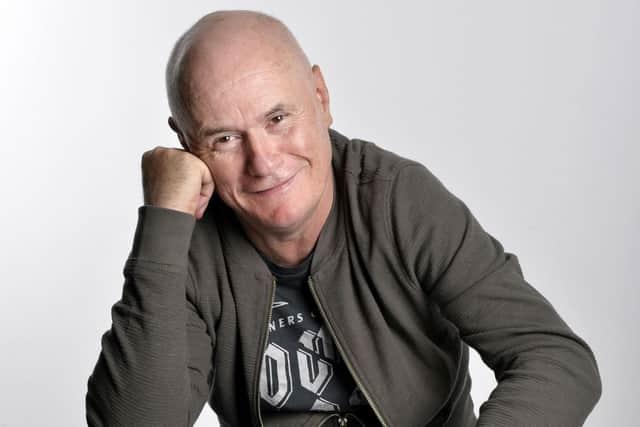Dave Johns on bringing I, Daniel Blake to the stage: 'The timing couldn't be more right'
It would be nice to think I, Daniel Blake had become a period piece. The Ken Loach movie, winner of the Palme D’Or at Cannes, was released in 2016 and drew inconvenient attention to the miserable way social security claimants were treated by Britain’s support system.
In the film, the fictional Daniel Blake is a joiner who has been instructed by his doctor not to return to work because of a heart attack. But when he turns to the state, he is denied financial support. The reason? An assessment has declared him fit to work – despite the assessor never having consulted his doctor.
Advertisement
Hide AdBlake's attempt to appeal the decision sends him into a byzantine maze of bureaucracy, made nearly impossible because nearly everything takes place online. As a joiner, he has never used a computer and has no idea of what is wanted of him. From his perspective, the system is geared up to make his claim fail.


The same is true of single mother Katie Morgan, a new arrival in Blake's native Newcastle, who becomes his friend as she tries to navigate food banks and job-centre appointments.
The point of the film, scripted by Paul Laverty, is these claimants are not criminals trying to game the system, but desperate people in need of support. Seven years on, you would have hoped the benefits system would have become better at distinguishing between the two.
Not so, says Dave Johns, the comedian-turned-actor who played Daniel Blake after being spotted by Loach. He has now written a theatrical adaptation of the film for Newcastle's Northern Stage and is shocked by the lack of progress.
"I talked to a few welfare rights people and I realised the only thing that's changed is the on-hold music," he says.
Johns is thinking of the second of two demands made by Daniel Blake in the movie's climactic scene. In graffiti, he paints: "I, Daniel Blake, demand my appeal date before I starve."
Then he adds: "And change the shit music on the phones!"
Advertisement
Hide Ad"It's not Vivaldi any more," he laughs. "It's some type of pop song. That's what they got from the film – they just changed the music."
Of course, there are those who argued the movie, being a work of fiction, could not be taken seriously as political commentary. Bringing the film to the stage in a production directed by Mark Calvert, Johns addresses such complaints head on.
Advertisement
Hide AdWith a cheeky meta-theatrical flourish, the production starts and ends with the words of Damian Green, former secretary of state for work and pensions, dismissing the film for being made up. As the story plays out, we are fed choice quotes from politicians such as George Osborne, Liz Truss, David Cameron, Thérèse Coffey and Lee Anderson. The gap between rhetoric and narrative challenges the audience to decide whose version of the truth is most credible.
"You don't want to just put the film on stage, you want to have something else to say about it," says Johns, whose adaptation with Owen O'Neill of The Shawshank Redemption opened on the Edinburgh Fringe in 2013 and has toured ever since. "Government ministers stood up in the House of Commons and said it was a work of fiction. Then you've got ordinary people coming up to you and going, 'That happened to my dad.' You're saying it's not happening, but the people on the ground are saying to me every day and even up to now, no, this is happening."
If anything, Johns thinks the situation for claimants in 2023 is even bleaker than it was when he made his screen debut. Back then, foodbanks were relatively rare. Johns had never even heard of them until he started filming. "When I got on the set for I, Daniel Blake it opened my eyes," says the former bricklayer. "I always say, tongue-in-cheek, that Ken radicalised me."
Today, foodbanks are ubiquitous – an unofficial safety net, dependent not on government funds but volunteers and goodwill. "The film had such an impact because a lot of people didn't know about foodbanks and were stunned that the system was there to thwart you," he says. "I wanted to explore what was happening now. There are more food banks in the UK than there are McDonald's. The narrative now is that food banks are normal. It's like when workhouses were normal."
Throw in a cost-of-living crisis and the experiences of today's Universal Credit claimants, and I, Daniel Blake remains sadly pertinent. This time around, Newcastle actor David Nellist takes on the role first played Johns, giving a portrayal of a man who is neither a troublemaker nor a soft touch but someone with a deep sense of right and wrong. He is not bolshy but he is prepared to stand up to injustice when he sees it.
"What hit more than anything about the film was that Katie and Dan were ordinary people," says Johns. "The narrative before that had been that everybody on benefits didn't want to work and were scroungers. The idea was to force them back into work. Suddenly people realised: that could be daughter, my uncle, my dad, my sister. They were stunned that the system had got out of control. It wasn't there as a backup, it was there to thwart you."
Advertisement
Hide AdHe adds: "Nobody goes to a foodbank because they want to. It's not like, 'Oh, I know, I'll get some free food.' This is when we thought, yes, there is something more to say about this. The timing couldn't be more right."
I, Daniel Blake, Traverse Theatre, Edinburgh, 17–21 October.